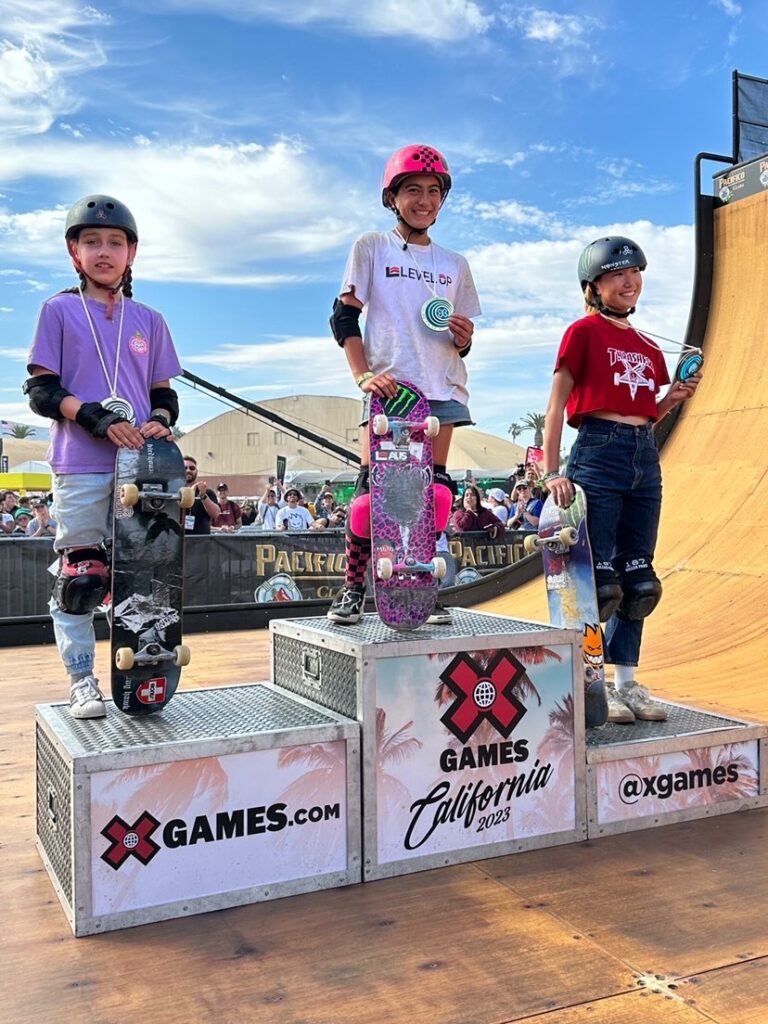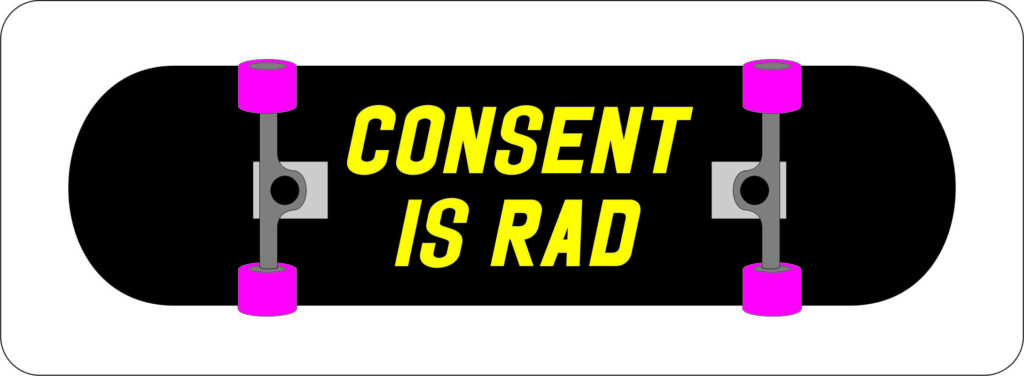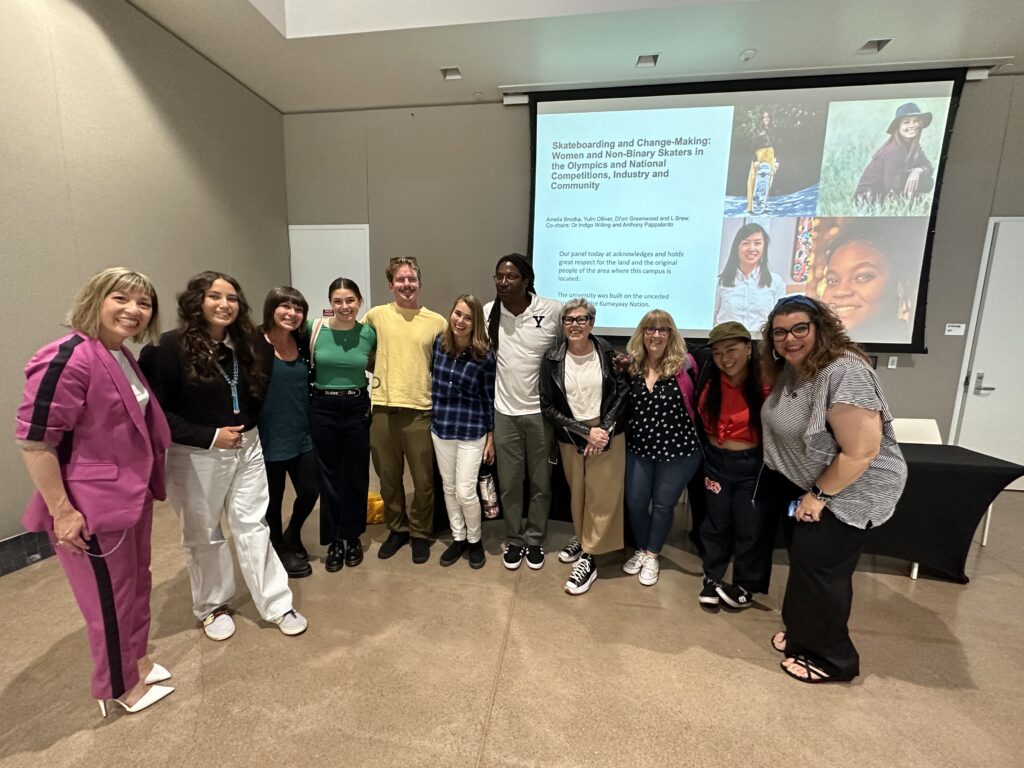Two Australian girls, Chloe Covell (aged 13) and Arisa Trew (also 13) have just won gold in the Street and Park divisions at the latest X-Games competitions in California. The X-Games is, to skateboarding, what Wimbledon is to tennis in terms of its prestige and world class competitors.
Such achievements are all the more remarkable for a sport that has a tradition of being dominated by men and where women’s competitions have had to overcome many serious barriers. This includes with the X-Games once cancelling the women’s vert division in LA less than ten years ago in July 2011 due to the organisers lack of faith in both the audience potential and more importantly, the talent.
Over the years however, as the just-released co-authored book ‘Skateboarding, Power and Change’ (by Willing and Pappalardo, Palgrave Macmillan) highlights, there have also been hard-won leaps forward. This includes calls for better pay and visibility by elite women skateboarders such as Cara-beth Burnside and Mimi Knoop whose actions included boycotting the X-Games in 2005.
There is also plenty of behind the scenes advocacy by people such as Kim Woozy who helped testify and bring in the ‘Equal Pay for Equal Play’ bill in California. Today’s generation of women and non-binary skaters have been able to build up their sport on the foundations of a history of women and LGBTIAQ+ led advocacy and the results are speaking for themselves.

Arisa Trew (centre) receiving Gold at X-Games California. Picture: Supplied/Trew family.
Both Chloe Covell and Arisa Trew are also Olympic contenders for Paris 2024 as confirmed by Skate Australia, the national sport organisation for the sport. There are expectations both girls will also be a part of the Games in LA 2028 and back home in Australia for 2032. Last month on 24 June Chloe Covell, from northern NSW) won silver at the World Skate Skateboarding Street World Tour event in Rome, Italy, where skateboarders earn world ranking through points to qualify for the Paris 2024 Olympic Games.
Continuing the Australian skateboarder’s run of capturing the world’s attention, on 25 June Arisa Trew, from the Gold Coast, QLD set a world record in Salt Lake City, Utah USA as the first skater in a woman’s division to land a 720 trickon a vert ramp. A story by the Olympics News also emphasised that this was achieved in front of Tony Hawk who not only invented the trick but is also the world’s most famous skateboarder. Trew performed the same 720 trick at the X-Games in California this month, making her the first ever to win a competition in the women’s division doing so.
Each girl has their own style and brings something remarkable to skateboarding, with Covell’s street runs including highly difficult switch tricks (using the opposite stance one usually skates) and Trew’s world-record breaking ‘never been done’ (NBD in skaters’ terms) moments in park and vert competitions.
The future of skateboarding is not only looking more inclusive but also pushing aside old stereotypes that ‘girls can’t skate’ with a barrage of never seen before technical skills by both Covell and Trew. These girls are joined by other talented young girls and women skateboarders from Australia such as Ruby Trew, Haylie Powell, Liv Lovelace, and Felicity Turner.
At the same time, both nationally and on the international stage, there remain rules and categories in competitive skating that can exclude and misrecognise skaters’ authentic selves and erase their presence and achievements. This includes within the Olympic Games where research (such as by Willing and Barbier, 2021) on the gender binary highlights pressures placed on non-binary and transgender skaters to conform to unrealistic and unscientifically proven parameters of gender.
In Tokyo Games in 2021, Outsports highlighted how non-binary competitor Alana Smith was misgendered by sport commentators, who has since used the occasion to educate press on pronouns. In the documentary Stay on Board: The Leo Baker Story (2022), a former USA Skateboarding team member and elite professional skater Leo Baker also talks about how he withdrew before the Tokyo 2020 Games during his gender affirmation due to not wanting to compete within such narrow frameworks of gender.
In the skateboarding research article ‘Before the Gold’ by Dr Neftalie Williams it is also pointed out that skateboarding, like other sports, is also not immune to issues such as racism. More broadly, as Professor Belinda Wheaton and Dr Holly Thorpe also outline in their book on Action Sport and the Olympic Games(Routledge, 2022), there are various structural conditions that also demand attention to make skating competitions such as the Olympics accessible to skaters from a variety of disadvantaged backgrounds. And as a recent panel at The Stoked Sessions Conference at San Diego State University that focused on looking at skating through an intersectional lens, this includes across issues connected to income, class, age, gender, sexuality, race, colonialism, conflict zones and geographies.
The panel was chaired by myself and Anthony Pappalardo and featured Dine, Navajo Nation artist and skate educator Di’orr Greenwood; The Skatepark Project BIPOC Fellow L Brew; FUBU action sport agent Yulin Olliver; and the founder of Exposure Skate and Olympian skater Amelia Brodka. While skating may be global, the panellists emphasized that it is not rolled out on an equal playing field. And while skating is also local, it is, as Douglas Miles Senior from Apache Skateboards, on Native/Indigenous Land.

Photo features panellists Yulin Olliver, Di’orr Greenwood, L Brew and Amelia Brodka with Dr Indigo Willing and other speakers at The Stoked Sessions San Diego State University conference. Picture: Alec Beck
In skateboarding campaigns such as by the women’s run network Poseidon Foundation, skaters are also joining calls for the inclusion of WCMX and adaptive skateboarding to be included in the Olympics. Over a four day span at World Skate’s San Juan event in May 2023, interviews were conducted with competing skateboarders such as Tokyo Olympic medal winner Sky Brown advocating for adaptive skateboarding to have its place in the Olympics and Paralympic Games.
As Poseidon Foundation’s President Micaela Ramirez states, “adaptive skaters themselves are requesting their demo take place in Switzerland for the upcoming September competition.” She adds, “the high calibre of folks advocating for this cause is a clear indicator of the passion, significance and importance of providing an opportunity for adaptive skaters to showcase their amazing talents.” World-ranking and professional level WCMX and adaptive women skateboarders leading efforts to draw attention to their sports internationally include Tia Pearl and Kanya Esser in the US and Lily Rice in the UK. In Australia, Timothy Lachlan who openly identifies as a Queer skater also runs workshops to increase the participation of all genders through his network and coaching initiative WCMX and Adaptive Skateboarding Australia.
Another pathway that is far less talked about but requires urgent attention is how to ensure safety, respect, and a culture of consent in skateboarding as it continues to grow in popularity and status.
Many of the star skateboarders from Australia and internationally are also girls who are still under 16, and this demands assurances at all levels that they are well looked after as athletes, but also emotionally and psychologically. Furthermore, issues of sport integrity and abuse also affect all sports, and skateboarding needs to fasten its strategies for keeping everyone safe.
Currently, skateboarding may be way behind other sports too in this regard, as it has emerged from a subculture and youth culture that has not been restricted by rules, regulations and being an incorporated sport. While its comparative lack of structure allows for its social dimensions, spontaneity, fun, creative flair, and artistic side to thrive, there can be troubling gaps in support and protection of its participants too.
Current initiatives include the ‘Win Well 2032’ campaign, whose website emphasises values such as “how we win is just as important as when we win” and that participating sports including Skate Australia commit to “prioritising and focusing on the physical, mental, emotional, and cultural wellbeing of our athletes, coaches, staff, and sport as a whole, we will unlock our full potential and Win Well.”
The campaign is part of Australia’s High Performance 2032+ Sport Strategy and recognised by The Australian Institute of Sport and eight State/Territory Institutes and Academies of Sport, representing Federal, State and Territory Governments. National Sporting Organizations, including Skate Australia, are also now making a commitment to the objectives of and working with Sport Integrity Australia, where members can make formal complaints on issues from bullying to sexual misconduct.
Both initiatives are relatively new with Win Well 2032 having been launched this year and Sport Integrity Australia in 2020, so the overall impact they can make has not had much time to be measured in the world of skateboarding. Moreover, not all skateboarders are members of Skate Australia, making it difficult for complaints to be investigated. The impact of existing protection and support mechanisms for skateboarders at an elite competitive level, and especially athletes aged under 16, remains a critical area for more research as well as the gaps.

The “Consent is Rad” logo. Picture: Supplied
There are more ‘on the ground’ and community-led campaigns such as Consent is Rad, which I launched as a co-founder in 2019 at Pushing Boarders in Malmo, Sweden. Consent is Rad is an internationally focused community initiative co-founded by a team based in Australia and has an international focus.
Despite being volunteer run, its simple “no naming, no shaming or blaming” educational messages about challenging a macho ‘rape culture’ that has been long been a hushed up but harmful element in skating and embracing consent cultures in skateboarding has resonated worldwide. It has also received 2nd place in the Skate Rising Social Projects category in the Exposure Skate Awards in 2021, and that won equal first place in the Social Project of the Year Award in 2023 from Skate Like A Girl. Consent is Rad has collaborated with groups from Europe, the US and Australia and produced a range of educational resources.

Photo of Dr Indigo Willing holding a sign at the launch of Consent is Rad at the ‘Support Your Local Academic’ panel at Pushing Boarders, Malmo, Sweden 2019, taken by artist ‘Star Buttons Spark.’ Other panelists include Dr Sander Holsgens, Stuart Maclure, Dr Luke Cianciotto, Dr Adelina Ong and Sophie Friedel. Picture: Supplied
However, with women and non-binary led campaigns such as Consent is Rad, there is a risk that the information is only reaching those who are affected by sexual violence or are already allies and not ‘getting through’ to populations who need to be educated the most. In response to this, Consent is Rad has also worked in collaboration with a facilitator and team of overseas skaters on projects like the Break the Cyclecampaign that ran in magazines such as Thrasher that reaches a huge audience of boys and men.
There has also been the ‘Red Flags, Banter and Blurred Lines: Exploring Consent is Sport’ project by a research team from the Griffith Centre for Social and Cultural Research and Sport and Gender Equity HubGriffith University including myself and Dr Adele Pavlidis, Professor Simone Fullagar, Professor Molly Dragiewicz and Dr Justine Hotten where we examined how men leaders in various types of sport (from tennis to rugby) talk about consent. The findings will be discussed in an upcoming seminar on 27 July for the Gender Equality Research Network who also provided seed funding for the project. More ongoing support and funding however is needed for such campaigns to achieve more impact and for research projects to keep on examining their effectiveness.
In summary, skateboarding for girls, women and non-binary skaters has come a long way in providing opportunities for everyone to be able to participate at whatever level they want, including at the high-performance level of elite competitions.
The future will no doubt see many more switching up of traditions and NBDs. We should all get on board and support this trajectory and do so with more than just cheers from the stadiums and ‘heart’ emoji and ‘thumbs up’ clicks on social media. We need also need to bring in policies, safeguards and both community-led and institutional level strategies to ensure skaters can be safe from physical, emotional, and psychological abuse, free from discrimination, and able to just do what they love and have fun, which is the reason skateboarders started doing what they do in the first place.
- Picture at top: Chloe Covell with her X-Games gold medal. Photo: Colin Bane.
The post Aussie girls smash skateboarding championships in the US appeared first on BroadAgenda.
This post was originally published on BroadAgenda.

